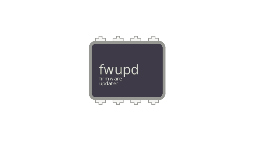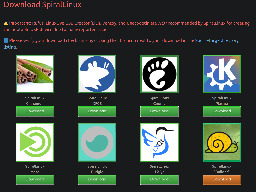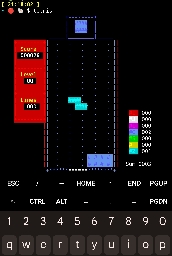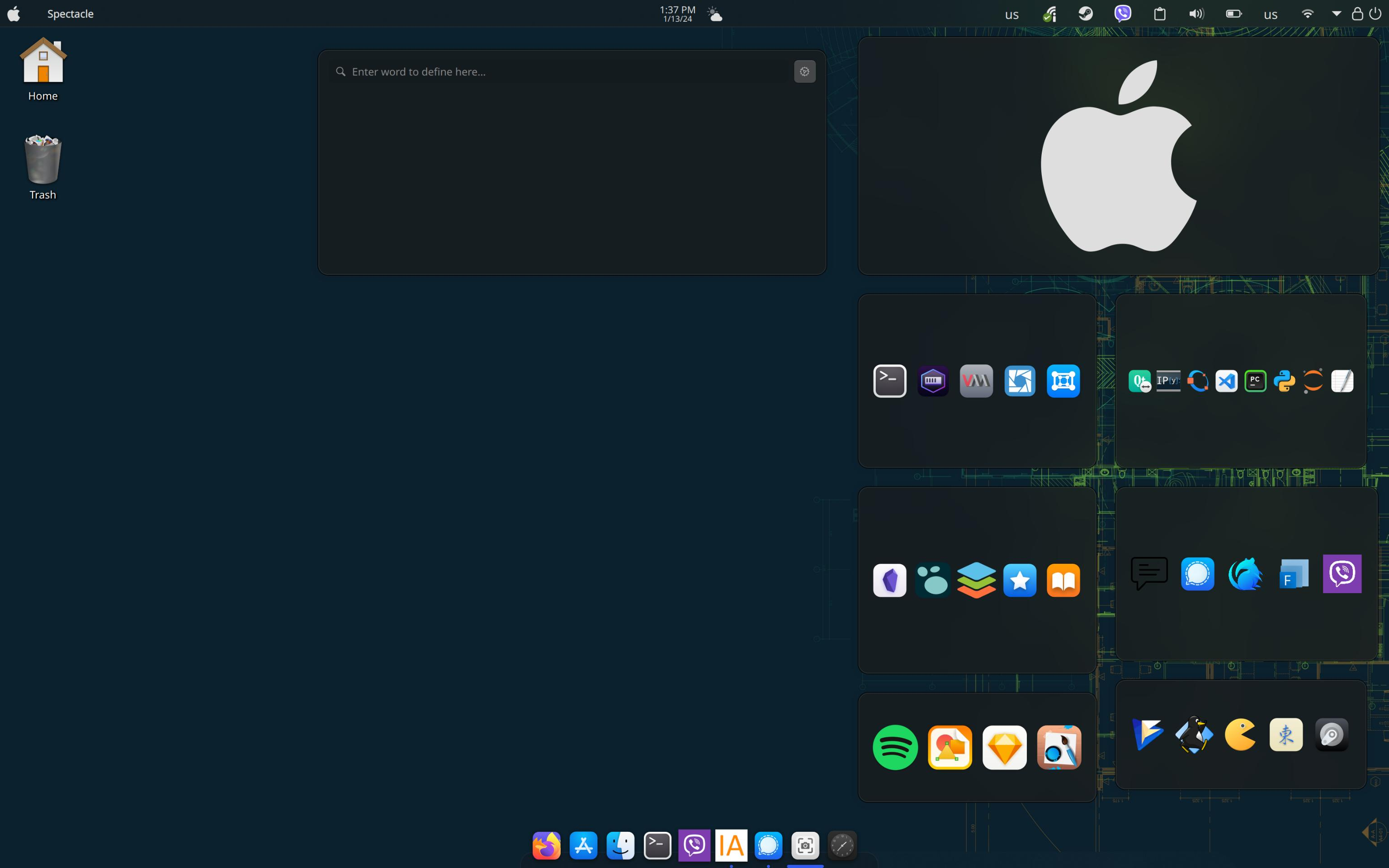Fwupd Will Use Zstd Compression










Balls of plastic. Descended from balls of steel 💪
It is finally upon us.
THE YEAR OF THE LINUX DESKTOP!
Terms and conditions apply. It could be the next year, or the year after, or not at all.



I have a massive subscribe list, and I usually just read subscriptions. I'll occasionally (maybe once it twice a week) read all, and if I notice interesting communities: subscribe to them too.
wayDroid does let you do that, in a fairly lightweight way (uses Linux namespaces iirc, similar to lxc.
It's still not full native, which would be even nicer. I play droidfish on my Linux machines using it.
Sounds like dogs barking at/with each other in the night back when I was growing up. You'd hear the occasional how-how-hoooooww from one of them, and others would join in. Wolf'ish in some ways. The city I grew up in was much less crowded back then.
Now: I guess self driving cars fill in the void left by dogs not barking at each other anymore.
🐺 --- > 🚗
Unlike real Apple devices, his contraption wasn’t programmed to collect any data from nearby iPhones, even if the person tapped and accepted the prompts. But, in theory, they could have collected some data, according to Bochs.
The article states reasons which aren't limited to what happened. I understand and agree with your sentiment about the supply chain issue being something that could happen anywhere - those were my initial thoughts too.
The reasons for shifting are related to speed, other mainstream software already having made that switch years ago (pre incident), and unfortunately... More robustness in terms of maintainers.
Open source funding and resilience should be mainstream discussions. Open source verification and security reliability should be mainstream discussions: here's a recent mastodon thread I found interesting:
https://ruby.social/@getajobmike/112202543680959859
However, people switching from x to z (I did see what you did there) is something that is going to happen considering the other factors listed in the article that I summarized above.
Nobody cares about the $135000, I told you!
super productivity is pretty good.
You can also sync between your phone, desktop, etc using different sync options including Dropbox, webdav, local file, etc
The traffic is stuck in the traffic🚦

Poor bot did its thing, but the article starts off in a way it can't handle well it seems.
Yes, an opinionated customized installer that seems to be aligned with my own thoughts of great out of the box usage.
They do. They did. What do you do when a 'good guy' is really a bad guy? Happens outside of software too. Someone inserts themselves into an organization while secretly working against its interests.
Here's a good summary. However, you should read a few articles - plenty have been going around, including on Lemmy.

Try running it from the command line with code --disable-gpu.
If that works, you can update the desktop shortcut files (exec section) with the same added parameter.
I recently ran into something similar (opensuse slowroll//kde)
Ref: stackoverflow/Google for the --disable-gpu argument, the desktop file editing - I did for convenience.
Here's how you can find . desktop files
Desktop file reference.- easy format
I'm generally not a fan of endless os (very locked down), but this might be a good low-maintenance option for libraries.
Endless comes out of the box with offline educational materials and learning apps.
Flatpak based distribution.
That would be cool.
Here's my new setup that might not work for everyone, but I'd recommend thinking about if you're able to.
Network printers are blocked from Internet by my router. They have static IP addresses allocated (permanent DHCP leases) for convenience.
I have some Canon laser printers. I don't want to install Canon software across my devices, so I setup a cups print server (lxc container) where I installed the software.
I setup and shared the printers (local network only), made them discoverable.
I use the CUPS web GUI over ssh tunnel if I need to check on job queues and do maintenance/admin tasks (don't usually have to).
Clients immediately find the printers on the server, no driver required.
As a bonus, I made the margins 0 on the CUPS ppd on the server so that I get to print without margins when so desired (Canon has fixed minimum margins otherwise).
The one caveat is that the Canon drivers don't work on raspberry pi (arm), so while I have a to-do to get around that by using a virtualization layer, you need a separate Intel/AMD machine for the print server if your printer doesn't support ARM.
I bought this set of 206 stickers from Amazon a few weeks ago for $10 (9.99, but that's really 10).
The stickers are very hard to peel off till you get the hang of it, but can vouch.

This is the caveat for me for now.
To run locally a powerful graphics card with at least 6 GB VRAM is recommended. Otherwise generating images will take very long!
I've got decent RAM on an I9, but my graphics card, which is what matters here, isn't up to par.
Ubuntu uses snaps, which I've found sluggish on older ide hard drives. To be honest, even flatpaks are very slow for these in my experience.
I think you might be better off with opensuse tumbleweed.
Novelty recommendation besides tumbleweed: antix.
While I haven't used antix except out of curiosity in a virtual machine, they are lightweight, but they have a hard stance against systemd.
Linux mint Debian edition or Opensuse tumbleweed.
Slow Internet/less updates, older, more tested software, slightly wider package availability: LMDE.
Faster Internet, more updates, very new (but well tested) software, needs slightly more technical knowledge sometimes: Opensuse tumbleweed.
I personally use Opensuse Slowroll, which is a slower rolling release experimental version of Opensuse tumbleweed.
supertuxkart SuperTuxKart (A 3D arcade racer with a variety of characters, tracks, and modes to play.

KDE Plasma 5 on Wayland, Opensuse Slowroll. Big Sur theme with latte dock. 4 virtual desktops in a 2x2 grid (not visible in screenshot)
Different docks for different kinds of apps.. Slightly ugly, but very convenient.
Proprietary snap store backend that is controlled by Canonical: that's it.
I used Ubuntu for years: installed it for family and friends. I moved away around a year ago.
Moving packages like Firefox to snap was what first started annoying me.
If the backend was open source, and the community could have hosted their own (like how flatpak repositories can be), I might have been slightly more forgiving.
Did a quick Google to find if someone had elaborated, here's a good one:

That's not right. Debian/suse are no less out of the box user friendly than Arch - not counting endeavouros/Manjaro, they're more friendly.
Arch still needs extra setup and configuration after install. Endeavouros makes it a bit simpler, but there's still configuration (and ricing) invoice. Auto-discovery of printers (cups, avahi), graphical configuration tools out of the box, user permissions/group membership setup out of the box in a way that new users (or even power users) can just set things up graphically... all of that needs extra work.
That's the extra configuration that this is providing.
If you want persistent messages, use a messaging app like another poster posted. KDE connect should work, but it doesn't work for my setup for some reason.
If you just need transient messages, which is more of my usecase, and lightweight sending, use pairdrop.
snapdrop and pairdrop app from fdroid for Android, pairdrop website in desktop.
You can just use the website instead of app on phone too.
Sending over LAN is local - it doesn't go outside your own network.
If devices are on same WiFi, no pairing required.
You can also send across networks by pairing.
Nominative determinism is pretty accurate. Steve Jobs did generate a lot of jobs. Bill Gates had a lot of gates to his name.
just in case it wasn't obvious
Thanks for that link, it gave a bit more context into what OP was talking about.
The article does link to this archive.org link, which seems to back the title.
On the other hand, I also see articles like: KDE Foundation hires Dwarf Paladin as new Executive Director, which make me agree that this seems to be a bit on the malicious side.
It does make me want to dig around a bit now though.
I have Nixos on a laptop, and have a love//hate relationship with it.
I love the customizability and declarative setup.
I hate the number of times I've sunk down rabbitholes trying to set specific things up on it.
The updates being done via switch are a bit inconvenient, but cool enough.
The fact that I can't customize everything, particularly on kde, is slightly sad.
All in all, I really like it, but wouldn't recommend it for my less technical friends, who I'd normally install Ubuntu for. This has gone up my list, close to Opensuse slowroll and Linux mint Debian edition now.
Now onto the four body problem!
I have ~/git for fit repos, and a dedicated ~/git/ext for repos I do not own, but have locally cloned for various reasons.
Wow, that's so messed up: I didn't know HP did that.. I think it might just be a matter of time before others follow suit.
Sounds very Wireshark worthy!
Yep... definitely crazy. Tried easy, was thinking I seemed to be pretty smart up to 4 lines. Then it just kept screwing me with two alternating pieces and the holes started. It loves giving you angles that go the wrong way around given your current block layout 😅
Gotta try this for fifteen minutes then ditch it forever. Never heard of it before, but as they say: curiosity killed the cat!
I second endless os. Parental controls, locked down system, comes prepackaged with many educational apps.
As with all definitions, there is a gray area where people will have different boundaries on exact meanings. To you - a supplier relationship needs an explicit payment, which is a fair definition.
However, the more widely used definition that most people, including me, refer to, is not necessarily focused on the supplier, but on the supply - what we use in our toolchains is a supply - regardless of how it was obtained.
When there is an issue in a trusted supply, even if it was not a commercial relationship (a prerequisite by your definition), it is a supply-chain attack by the more widely used definition.

I see, you're right from that perspective.
For this 'distro', I like the emphasis the maintainer put on out of the box usability, including proprietary codecs, extra repositories that are not enabled/added by default, but widely used, flatpak setup out of the box, printer permissions relaxing etc.
To be honest, I've never owned an apple device: only Android phones and windows (with Linux immediately installed) laptops. However, I kind of like the icon aesthetic the most out of all the ones I've tried.
The theme also grew on me during my Gnome days, so yup, these days I pretend my device is an apple from a cosmetic sense 😂
I'm pretty much a superficial user regarding office programs, particularly draw. However, I did want to have borders around my text recently, and found you can insert a single celled table with the border you want.
Would a worse hack with a single celled table in a single celled table (different border colors) do the trick for you?


I'm a bit sad that my favorite (Infinity/Eternity) isn't that high up. Loved it since my Reddit days. Tried different clients: Lemmy, thunder, liftoff, sync,... still like this the most!